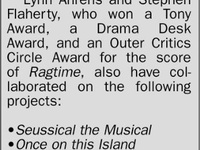After Lucky Stiff, Ahrens and Flaherty composed Once on this Island, which won eight Tonys.
Having made a name for themselves, the pair was hired to write the soundtrack of 20th Century Fox’s animated film Anastasia in 1997.
“In theater, you work for years and earn nothing. In Hollywood, they pay you, but they own your work” Ahrens advised aspiring artists. “If the daughter of the producer says, ‘Daddy, I think she should be sitting right there when she sings that song,’ then you have to rewrite the song.”
The pair also addressed some of the flaws of Seussical, the Musical, which they composed.
Despite being named one of Time’s “Top 10 Theater Events” of 2000, the show received mixed reviews.
While the two do not usually view the set as vital to a show’s success—Ragtime is now playing in the West End with virtually no set beyond “simple black chairs,” Flaherty said—the problems of Seussical in their eyes stemmed from problems with setting.
“Seussical, more than any other show we’ve worked on, depended on design,” said Flaherty.
“Somehow, the minute you got the sets, the costumes, the lights, you were distanced from the material,” Ahrens said. While both recognized flaws in their show, once it entered production, few adjustments could be made they said.
“Our lead male took seven weeks just to learn one song,” Ahrens said. “You can’t just change.”
Following the moderated portion of the program, the audience quizzed the pair on matters ranging from inspiration to script development.
Ahrens told Beth Deveney, who has run a children’s theater program in Cohasset, Mass. for 15 years, that musicals resemble Amish quilts. “The Amish used to make their quilts green or blue and then put in one red patch because only god can create something perfect,” she said.
Although Ragtime was first performed on Broadway in 1998, Ahrens said she is “only now” happy with the musical because of the changes she made before the recent West End production of the show.
Ahrens and Flaherty will critique the original songs of 12 College students today at 3:00 p.m., again in the Winthrop House Junior Common Room.
The Learning From Performers program, organized by the Office of the Arts at Harvard, has brought several hundred artists to Harvard in the last decade.
Leon Gruenbaum, the inventor of the first strap-on keyboard that he calls the “Samchillian Tip Tip Tip Cheeepeeeee,” will come to Cambridge later this month, and composer Quincy Jones will visit in February.
Thespians lauded yesterday’s discussion and the series more generally.
“The Learning From Performers program is useful and important to those continuing in the arts, which are somewhat neglected here,” said Johanna S. “Jo Jo” Karlin ’05, a board member of the Harvard Radcliffe Drama Club. “We don’t have faculty that can teach you what these people can.”
Ahrens said that from her perspective, Harvard students are receiving ideal preparation for the art world, as well as the world more generally. “I know of a lot people that go to conservatories and then do great in their auditions in New York, but I’m not so sure that they’re well-rounded. What I see here is that students are getting a fantastic education and also immersing themselves in the arts on a volunteer basis,” Ahrens said.









